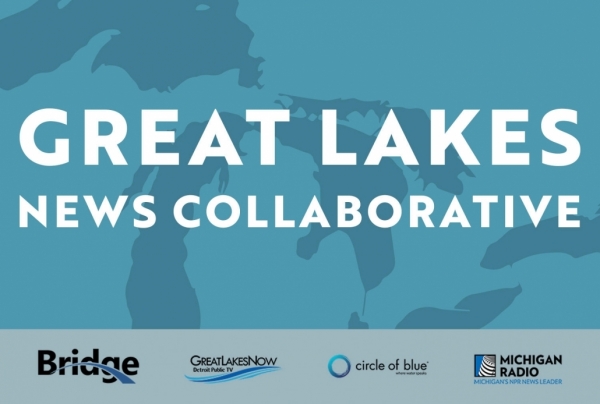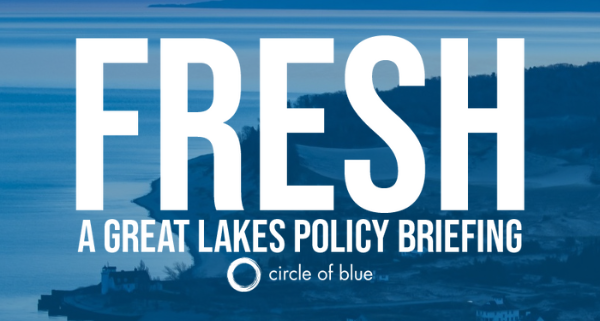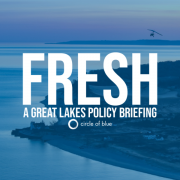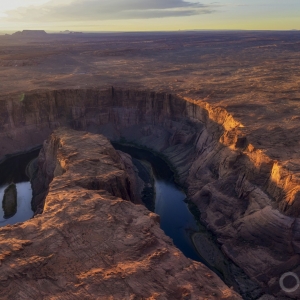FRESH, August 23, 2022: Lake Erie Wind Project Can Proceed, Ohio Court Rules
August 23, 2022
Fresh is a biweekly newsletter from Circle of Blue that unpacks the biggest international, state, and local policy news stories facing the Great Lakes region today. Sign up for Fresh: A Great Lakes Policy Briefing, straight to your inbox, every other Tuesday.
— Laura Gersony, Fresh Editor
This Week’s Watersheds
- Ohio’s Supreme Court allows a Lake Erie wind project to proceed.
- Wisconsin expands its private well replacement program.
- Tension grows between Canada’s federal and provincial governments over an Indigenous-led conservation program.
- New climate laws could fuel a “Battery Belt” of manufacturing in and around the Great Lakes region.
- A proposal for an oil pipeline tunnel underneath Lake Michigan enters environmental review.
In Pennsylvania, a study links fracking to childhood leukemia.
“Existing setback distances, which may be as little as 150 feet, are insufficiently protective of children’s health.”
— Cassandra Clark, postdoctoral fellow at Yale Cancer Center.
A new study finds that Pennsylvania children who were born near fracking sites face a greater risk of cancer, The Hill reports. The study examined 405 children who were diagnosed with acute lymphoblastic leukemia between 2009 and 2017. Children whose birthplace was within 1.2 miles of a fracking site were two to three times more likely to be diagnosed with leukemia, a conclusion that points to exposure during the mother’s pregnancy as a risk factor. Unconventional oil and gas development, also known as hydraulic fracturing or “fracking,” employs many chemicals that are known or suspected to cause cancer. Most states have public health measures in place to prevent exposure to these chemicals, such as a “setback distance” between a home and the nearest fracking site. Pennsylvania has a minimum setback distance of 500 feet. The study’s authors say that existing setback distances, which in some parts of the country are as low as 150 feet, are putting children at risk.
Fresh from the Great Lakes News Collaborative

- Reports: Huron River largely dodged hexavalent chromium scare — Bridge Michigan
- Why are mallard duck populations falling in the Great Lakes region? — Michigan Radio
- Two Generations and $70 Million Later, Muskegon Lake Is Restored — Circle of Blue
The Great Lakes News Collaborative includes Bridge Michigan; Circle of Blue; Great Lakes Now at Detroit Public Television; and Michigan Radio, Michigan’s NPR News Leader. We work together to produce news and information about the impact of climate change, pollution, and aging infrastructure on the Great Lakes and drinking water. This independent journalism is supported by the Charles Stewart Mott Foundation. Find all the work here.

Lake Erie Wind Project Can Proceed, Ohio Court Rules
After more than two years of legal uncertainty, the Ohio Supreme Court ruled that North America’s first freshwater wind development may proceed, Energy News Network reports. The pilot project will consist of six wind turbines in Lake Erie, about eight miles offshore from Cleveland. Development had stalled since 2020, when regulators introduced a measure intended to prevent the Icebreaker Wind project from operating for most of the year. Citizen groups, some funded by the coal company Murray Energy, also challenged the project over its risks to the environment, though these claims were rejected in court. Developers say they must now secure commitments to buy all of the project’s electricity.
In the News
PRIVATE WELLS: Wisconsin announced a $10 million grant program to replace more than 1,000 private water wells located near large farms, writes the Milwaukee Journal Sentinel. The funds are meant for homes affected by manure pollution from factory farms or farms that use large volumes of fertilizer. The new program gets rid of a requirement that water wells be used for livestock, and it lowers the threshold of nitrate pollution to qualify for the program, from 40 parts per million to the state health standard of 10 parts per million. About 10 percent of private wells in Wisconsin fail to meet these guidelines, according to water agency estimates.
INDIGENOUS CONSERVATION: Internal documents obtained by the Canadian news outlet The Narwhal suggest that Indigenous-led conservation plans may be a source of tension between Canada’s federal and provincial governments. An email from Greg Rickford, Ontario’s minister of Indigenous affairs, says that the provincial government has concerns that the approach to conservation “has encroached upon [Ontario’s] jurisdiction.” The suggestion has sparked controversy as some of the lands targeted for conservation are areas that provincial officials are eyeing for mining development, which could potentially fuel a low-carbon economy.
Looking Ahead
THE “BATTERY BELT”: The climate and tax bill signed into law by President Joe Biden last week will supercharge electric vehicle and battery manufacturing in the United States, Axios reports. The rush to establish domestic supply chains for clean energy technologies is creating what some are now calling the “battery belt” of manufacturers across America’s heartland, many of them located in the Great Lakes region.
LINE 5: The U.S. Army Corps of Engineers is beginning its environmental analysis of a plan that would route the Line 5 oil pipeline through a tunnel underneath Michigan’s Straits of Mackinac, MLive reports. The controversial plan is expected to draw thousands of public comments. Operators temporarily shut down another portion of the pipeline last week, as workers investigated and repaired a potential breach.
Upcoming Events
- August 25, 2022: Interagency Ecological Restoration Quality Committee Monthly Webinar Series — register
- August 30, 2022: Webinar: Lake Erie Algae in the Depth of Winter — register
- September 15-16, 2022: Fall 2022 Smart Ships Coalition Workshop — register
- October 11-13, 2022: Great Lakes Commission Annual Meeting – register
Other News
- Much of New York is on drought watch.
- A water main break results in boil-water advisories across metro Detroit.
- New state and federal legislation will boost electric transportation in Illinois.
Laura Gersony covers water policy, infrastructure, and energy for Circle of Blue. She also writes FRESH, Circle of Blue’s biweekly digest of Great Lakes policy news, and HotSpots H2O, a monthly column about the regions and populations most at-risk for water-related hazards and conflict. She is an Environmental Studies and Political Science major at the University of Chicago and an avid Lake Michigan swimmer.







Leave a Reply
Want to join the discussion?Feel free to contribute!